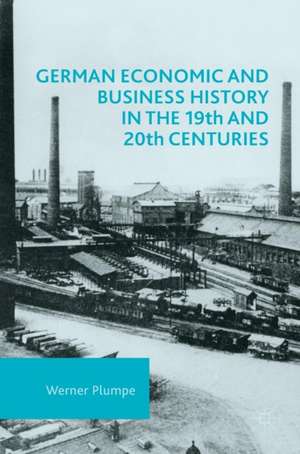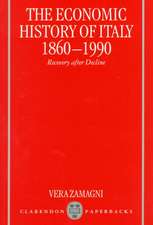German Economic and Business History in the 19th and 20th Centuries
Autor Werner Plumpeen Limba Engleză Hardback – 11 aug 2016
Preț: 787.15 lei
Preț vechi: 959.94 lei
-18% Nou
Puncte Express: 1181
Preț estimativ în valută:
150.64€ • 163.57$ • 126.54£
150.64€ • 163.57$ • 126.54£
Carte tipărită la comandă
Livrare economică 22 aprilie-06 mai
Preluare comenzi: 021 569.72.76
Specificații
ISBN-13: 9781137518590
ISBN-10: 1137518596
Pagini: 345
Ilustrații: XI, 367 p. 9 illus. in color.
Dimensiuni: 148 x 210 x 26 mm
Greutate: 0.59 kg
Ediția:1st ed. 2016
Editura: Palgrave Macmillan UK
Colecția Palgrave Macmillan
Locul publicării:London, United Kingdom
ISBN-10: 1137518596
Pagini: 345
Ilustrații: XI, 367 p. 9 illus. in color.
Dimensiuni: 148 x 210 x 26 mm
Greutate: 0.59 kg
Ediția:1st ed. 2016
Editura: Palgrave Macmillan UK
Colecția Palgrave Macmillan
Locul publicării:London, United Kingdom
Cuprins
German Economic and Business History from the Nineteenth Century to the Present Day: Introductory Remarks.- Part I: Economic Ideas.- 1. Economic Thought and Economic Development: On the Linkage of Economic History and the Historical Semantics of the Economy.- 2. The Birth of the Homo Economicus: Historical Thoughts on the Origins and Significance of this Model of Human Behavior for the Modern Economy.- Part II: Business History.- 3. The Improbability of the Jubilee – Or: Why the Only Way to Shed Light on a Firm is through its History.- 4. Business and Industry under National Socialism – An Interim Report.- 5. 1968 and German firms: On Marking Out a Field of Research.- 6. The Economy of the Kaiserreich: Noteson the Genealogy of German Capitalism.- Part III: Economic History.- 7. The National Association of German Industry (RDI) and the Crisis of the Weimar Economy.- 8. The Economic and Corporate History of Nazism: Reflections from the Perspective of Systems Theory.- 9. Germany as an Industrial Country 1945–2008.- Part IV: The History of Industrial Relations.- 10. Capital and Labor: Concepts and Practice of Industrial Relations in the 20th Century.- <11. Carl Duisberg, the end of World War I, and the Birth of Social Partnership from the Spirit of Defeat.- 12. Industrial Relations in the GDR: A Mere Footnote to German Economic History?.
Notă biografică
Werner Plumpe is Professor of Economics and Social History at the Goethe-University of Frankfurt, Germany. He studied history and economics at Ruhr University Bochum, Germany and received his PhD in 1985. He has held various positions in advisory boards, such as Chairman of the Academic Advisory Board of the German Society of Business History and President of the German Association of Historians.
Textul de pe ultima copertă
German economic history in the industrial age has classically formed an important basis for the study of economic growth and industrialisation more generally. This book aims to introduce English-language readers to modern German economic history based on a selection of work by one of Germany's leading economic and business historians, Werner Plumpe, who places particular emphasis on the institutional structure of the economy. Plumpe's work demonstrates that the country's economic evolution can only be understood by paying close attention to institutional peculiarities, such as the shape of industrial relations and the dynamics of corporate decision-making. It also emphasises the importance of the interconnectedness of capital and labour in the German coordinated market economy and draws attention to individual events and decisions that may have driven long-term economic development, but are rarely considered in approaches that deal primarily with macroeconomic growth.
German Economic and Business History in the 19th and 20th Century shows that Germany's economic history still warrants the application of an institutional view of economic transformation that is slightly different from the more formal perspectives dominant in the UK and the US. The book serves as a practical demonstration of a historicist approach to economic history introduced by the German Historical School a century ago, which still inspires large parts of German economic historiography.













